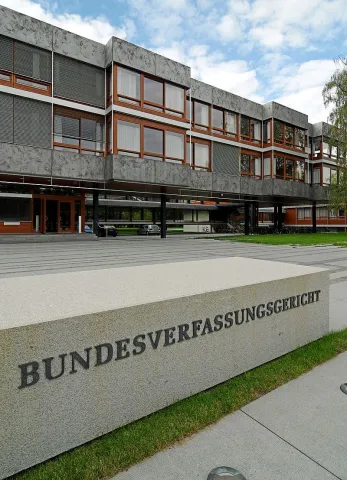German draft UPC ratification bill in parliament, chance of new constitutional challenges
October 9, 2020
Crucial months are ahead for the Unitary Patent project. In Germany the re-ratification process of the Unified Patent Court Agreement is progressing rapidly, but the threat of new constitutional complaints is looming.
Two weeks ago, the Bundesrat approved the UPC ratification bill. Yesterday, in first reading, the Bundestag referred the bill to the parliamentary committees (both the Committee of Legal Affairs and Culture will have their say) for discussion. A second decisive reading in the Bundestag is expected late October or early November. According to a report of Juve Patent, the UPC ratification should go through parliament in the slipstream of the discussion on the 2021 budget, “which means that a large number of members of parliament are guaranteed”.

The re-ratification of the UPCA ratification bill is necessary because last March the German Federal Constitutional Court (FCC) declared the first ratification invalid, because it wasn’t approved by the requisite two-thirds majority of the members of the Bundestag in 2017. Only 35 parliamentarians were present at the time.
It was a setback for the supporters of the UP system. The constitutional challenge, filed by Dusseldorf IP lawyer Ingve Stjerna in 2017, had caused three years of delay already and quite some observers thought the FCC’s decision would be the final blow for the system. But less than a week later, the German minister of Justice and Consumer Protection, Christine Lambrecht, issued a press release stating she would “continue to work to ensure that we can provide the European innovative industry with a Unitary Patent and a Unified Patent Court.”
Entry into force
German ratification of the UPCA and the Protocol for Provision Application (PPA) means the Unitary Patent system can at long last be launched – although two more UPCA signatory states need to be found to approve or support the PPA, a protocol designed to ensure the smooth start of the Unified Patent Court by enabling parties to complete the institutional, organisational and financial preparations for the court.
The UPCA enters into force “on 1 January 2014 [!] or on the first day of the fourth month after the deposit of the thirteenth instrument of ratification or accession in accordance with Article 84, including the three Member States in which the highest number of European patents had effect in the year preceding the year in which the signature of the Agreement takes place (…)” (art 89 UPCA)
The PPA enters into force “the day after 13 Signatory States of the Agreement on a Unified Patent Court including Germany, France and the United Kingdom, have either ratified, or informed the depositary that they have received parliamentary approval to ratify, the Agreement on a Unified Patent Court .. (art 3(1) PPA). Thanks to article 3(1), Germany can help ensure there is enough time for the preparations, by delaying the formal deposit of its instrument of ratification of the UPCA as long as necessary.
Complications
Supporters of the system hope the UPC can start functioning in the first half of next year, or “in a near future”, as the Preparatory Committee stated. This is the uncomplicated schedule. However, various serious issues will have to be overcome before the UPC and Unitary Patent see the light of day. Legally, there have been many questions since the Brexit referendum of 2016 and more so since the July announcement of the British government to withdraw from this European patent system. For just one example see article 3(1) above: how can the PPA enter into force when it is explicitly stated in the PPA that the UK’s approval or ratification is mandatory?
A hotly debated issue is the London section of the UPC’s central division (mentioned in article 7 of the UPCA). Now that the UK is definitely out of the game, this division will have to be relocated and the Italian government and the IP sector and governors in Milan have been very clear they want it to go to this city. After the recent (online) meeting of the UPC Preparatory Committee, quite a vague statement was issued by the committee, whereas the Italian Ministry of Foreign Affairs announced the formal Milan candidacy to the seat of the UPC. In a press release it stated that the committee “approved a provisional redistribution of the competence of the London office between the existing offices in Paris and Munich, provided, however, that this is a short-term solution, pending the entry into force of the Agreement and that Italy can start, in agreement with the other signatory States, the procedure for amending the Agreement to include Milan as the third seat of the central Court division.”

These are just some of the issues that remain unclear. Experts and interest groups who were asked to take a stand on the draft UPC (re-)ratification bill expressed serious concerns about the uncertainties raising from the Brexit and the German constitutional challenge. They pointed out, among others, that the FCC – by declaring void the German UPC ratification on formal grounds - didn’t have to go into detail about other possible issues, but seemed to hint in its judgment there is a problem with the unconditional primacy of EU law as provided for in article 20 UPCA. That could be contrary to the German constitution.
In an earlier post on this blog, “The German UPCA Ratification – at Schweinsgalopp towards Mautdebakel”, Thorsten Bausch, partner of Hoffmann Eitle, lashed out at the German Ministry of Justice and Consumer Protection and the European Commission for rushing through and supporting the rapid re-ratification of the UPCA. “Politically, I would respectfully submit that this is just madness.”
Still, it is clear there is a lot of support for the UP system. In July, BusinessEurope, Eurochambres, Orgalim and SMEunited sent a joint statement to European Commissioner Thierry Breton for the Internal Market, calling “for the swift ratification of the Unified Patent Court Agreement and the entry into operation of the European Patent system as soon as possible”. Breton himself has repeatedly said creating a “single European patent system” is one of his top priorities.
New FCC challenges?
At the moment, the main risk for the future of the Unitary Patent system is that another constitutional challenge will be filed with the FCC. It seems quite certain this will happen. Half September, the Foundation for a Free Information Infrastructure (FFII) sent an open letter to the Bundesrat, raising objections regarding UPC ratification “as it carries the risk to violate 3 international agreements (VCLT, ECHR and TFEU) and the German Constitution.” The FFII ends its letter warning: “If those points are not seriously addressed and the UPCA sent back for renegotiation, we will consider asking the German Constitutional Court to look again at those issues in a second Constitutional Complaint.”
Besides the FFII, it is not unthinkable that a new constitutional challenge will be filed as well by Ingve Stjerna. Shortly after the outcome of the first challenge, he pointed out to Juve Patent that the Constitutional Court had not dealt with the content of his objections to the UPCA and said: “If, despite these problems, the German government continues to adhere to the convention, a new constitutional review by the Constitutional Court will have to be considered, possibly of a complaint from a company.”
It is, at least to the author of this blog, not clear whether a second complaint would automatically mean the FCC would ask the German Bundespräsident to put the ratification procedure on hold, as happened when the first complaint was filed in 2017. The FCC declined to “provide any information on (…) legal issues or on any potential constitutional complaints that are intended to be lodged, but have not even been lodged yet.”
You may also like














Andre
There is a real and material opportunity that Germany would sack the ratification, so Europe can finally get a proper patent court as envisaged by the Eurpean Treaties. The Unitary Patent Court was ruined by the British, without recourse to the EUCJ. It makes no sense to ride this dead horse to ratification, a Court that one days should be established in London, while the Brexit-UK in their hatered against anything European abandonned participation. Europe deserves a proper community patent and a proper community patent court and an EU patent office. For a community patent a simple directive or regulation would suffice, no need to wait ten years for ratification of a badly designed court and its training platforms for non-judge-judges without eligibility to a office of a judge and the strange construction of bribes to the existing institutions.
Bangalore
FFII and its President threaten to submit constitutional complaints from time to time, see 2017: https://twitter.com/zoobab/status/874332456224161792 Nothing to really worry about.
MaxDrei
You would think that, by now, politicians would be sophisticated enough to assess sceptically what the professional lobbyists are telling them, especially when it is over an issue where financial self-interest plays such a dominant role. Was it not in Ancient Rome that the maxim Cui Bono was the first enquiry to be made? These days , what we should do is to "Follow the Money". Pushing for the UPC is a relatively small number of well-funded itinerant and international players who are adept in the use of lobbying power. On the other side is a much larger circle of small and medium-sized European users of the patent system, users for whom lobbying in Brussels or Berlin is as alien as Life on Mars. The fact that the petition to the BGH was NOT put together by a powerful player, and that Brussels and Berlin have no feeling of being harangued by opponents of the UPC, does NOT mean that the arguments are all in favour of the UPC, nor that the UPC (as presently constituted) is a good thing for society, the economy, innovation and the general welfare. UK government minister Michael Gove notoriously averred (in the context of the BREXIT Referendum) that the people think they have by now heard quite enough, thank you, from experts. I hope that politicians and their senior civil servants in Berlin and Brussels still want to hear from the experts, on the question whether the UPC will do, in reality, what its proponents are boasting it will do. In my opinion, as a European patent attorney with clients in Europe, Asia and North America, it won't.
Attentive Observer
I can only but agree with Max Drei! Ratifying the UPCA in its present state is a receipt for disaster. But as Max Drei says, follow the money. The UK has only sent a “Note Verbale” to the Commission. I am not acquainted with international constitutional law, but I would not consider that it is a proper withdrawal under the Vienna Convention of the Law of Treaties (VCLT). The UPCA has not even provisionally entered into force in order to allow Art 25(2) VCLT to be applied. The vague statement of the UPC Preparatory Committee about the reallocation of the duties foreseen for the London Section of the Central Division has, in my humble opinion, no standing with respect to the VCLT. It is certainly not a common declaration off all contracting states under Art 33(1) VCLT. Starting the UPC without having amended Art 7(2) UPCA and the annex which is part of the UPCA defining the classes to be dealt with in London is putting the head in the sand and ignoring reality. Banking on Art 87 UPCA to amend Art 7(2) UPCA after its entry into force is defying any common and legal sense. I take bets that Italy which is poised to take over the duties of the London Section will not allow this to happen. Any party seeking help from a judicial system should be heard by the legal judge foreseen. As there will be no legal judge in London, this condition is not fulfilled. This could be a problem for the FCC if a new complaint is filed. The UPC is bad for European SMEs, see the article of Mr Xenos "The Impact of the European Patent System on SMEs and National States and the Advent of Unitary Patent", published in Prometheus, Vol. 36, No. 1 (March 2020), S. 51-68. As most of the patents granted by the EPO are held by non-EU member states, where is the interest for EU industry to launch the UPC? It is giving those non-EU member states a single entry point to challenge European Industry. I do not see this as being beneficial. The UPCA is pushed by the big industry and their lawyers. The latter expect to get a lot of money. Both are intensely lobbying in favour of the UPCA. European SMEs are the fig leave behind which the lobbyists are hiding. Further to the problem of the legal judge, there is still the problem of the primacy of EU law raised on its own volition by the FCC. The FCC has dismissed the problem of the designation or removal of a judge, but this is not correct. How can a court be trusted if a judge can be removed from its duties without offering him any means of redress? The RoP of the UPC reach very far into the legal systems of the Contracting States, but have never been checked, not even by the Commission! It interesting to note that one of the greatest lobbyists for the UPC, Mr Tilmann has published in GRUR Int. 2020, 847 an interesting article on “The UPC without the UK: Consequences and Alternatives”. In Part II of his article Mr Tilmann claims that UK was a difficult partner from the start, which can even be held responsible for the fact that all the efforts for creating a “Community Patent” were torpedoed by the UK. He also considers that UK will lose out, but this is an acquired fact. But where is the attractivity of the UPC without the UK? The UPCA as not being common to all EU member states will simply add another layer of case law, but for what is this good? This case law can even be in contradiction with the case law of the boards of appeal of the EPO, and especially its enlarged board of appeal. On the other hand with the “dynamic interpretation” started in G 3/19, this problem could be resolved, but then, what about legal certainty? In Part III of his article, Mr Tilmann mentions “Alternatives to continuing?” and especially the “Incorporation into the CJEU court system” of a litigation system, but in order to immediately dismiss it in favour of the UPC. The reasons for the dismissal are the following: “Opposition to this centralistic structure was voiced from all sides at the time. The proposal was unanimously rejected by industry, lawyers and judges, not only but mainly because of the rigorous centralisation excluding local and regional divisions in EU Member States. Europe's big competitors, the US and China, have decentralised first instance courts for patent cases”. This is not a convincing reason at all. If subsidiarity is to be reached, this is attained by the present legal system as the number of truly supranational litigations is very low. This is comforted by the fact that the average number of validations in EU member states is at best between 5 and 7. Why do we need a system for 20+ states? It would be much more efficient to have increased meetings of judges dealing with European patents in the member states of the EPC. I claim that the common EU IP court was primarily rejected by lawyers as it would certainly not be tailored to their financial needs and their influence on the rules of proceedings would be greatly reduced, contrary to what happened for the UPC. Moreover such a court with judgements valid in all EU member states would require unanimity which cannot be reached at this level as some EU members states have either not signed (Spain) or will not ratify (Poland and the Czech Republic) as it is bad for their industry. There is a way different of the “reinforced cooperation”, which would avoid another layer of case law not valid for all EU member states, but this way would not be to the liking of the UPC lobbyists.
MaxDrei
Let's pick up on what Andre writes. Now that the British are gone, is that an opportunity to craft a better UPC? The EPC is the world's best law of patent validity precisely because it was a fusion (in 1973) of all the best in the two rival systems of Law in the world, civil law and English common law. In following the Rule of Law, Europe is a beacon of light for the rest of the world. If Europe is fit for the future, it ought to be able to create an EU-wide system of patent dispute adjudication that is an example to the world. Let's face it, for validity, there is nothing better imaginable than what we have already at the EPO. But the proponents of the UPC, the big international law firms, don't like it because their share of that particular "cake" is far too small for their liking. Compared with the enquiry into validity, that into infringement is far less time-consuming (and so less attractive to the proponents). However, if the pols in Brussels and Berlin and Paris and The Hague truly want a functional patent dispute system for the EU, let them set up local infringement courts and let everything go up eventually to the CJEU. One would hope though, that the CJEU would hold itself back from wrecking the established (and enormously persuasive) jurisprudence of the Boards of Appeal of the EPO. What does the Republic of Ireland think? After all, its courts run under English law and Ireland is full of American companies. Does Ireland want a UPC even after the departure of the UK? Should we ask it?